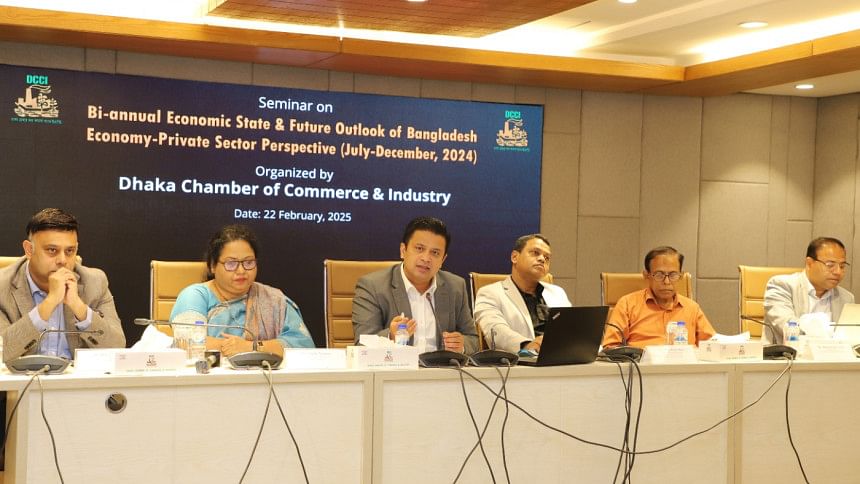Economic outlook clouded by inflation, high borrowing costs: DCCI

The private sector is grappling with growing uncertainty as inflation, investment stagnation, and energy shortages continue to weigh on businesses, speakers said at a seminar today.
"In recent months, business sentiment has been significantly affected by inflationary pressures, high borrowing costs, and exchange rate volatility," said Taskeen Ahmed, president of the Dhaka Chamber of Commerce & Industry (DCCI).
He was presenting the keynote at the seminar titled "Bi-Annual Economic State and Future Outlook of Bangladesh Economy – Private Sector Perspective", organised by the DCCI at its auditorium.
Ahmed stressed the urgent need for policy stability and structural reforms to restore business confidence.
"Private investment has remained stagnant at 24 percent of GDP, while foreign direct investment (FDI) has fallen to a six-year low. Without urgent interventions, sustaining economic momentum will be challenging," he said.
He noted that rising production costs, driven by inflation and energy price hikes, have put manufacturers under immense pressure.
"Industries are struggling with frequent power shortages and an unpredictable energy supply. The cost of gas has surged, yet supply remains inconsistent. If this continues, businesses will find it difficult to remain competitive."
On the financial sector, Ahmed highlighted the growing liquidity crisis and its impact on businesses.
"The central bank's 10 percent policy rate has made credit inaccessible for SMEs. Private sector credit growth fell to 7.3 percent in December 2024, well below the target of 9.8 percent. The high cost of borrowing is discouraging investment."
He added that while the ready-made garments (RMG) sector remains the backbone of the economy, 88 percent of exports are still concentrated in North America and Europe.
"We must actively expand into emerging markets like Africa, Latin America, and the Middle East to mitigate risks," said the DCCI president.
Ahmed called for policy consistency, tax reforms, and investment in infrastructure to support private sector growth.
"The private sector is ready to drive economic expansion, but we need clear and stable policies. If inflation, energy crises, and financial instability persist, businesses will struggle to sustain operations," he cautioned.

 For all latest news, follow The Daily Star's Google News channel.
For all latest news, follow The Daily Star's Google News channel. 



Comments